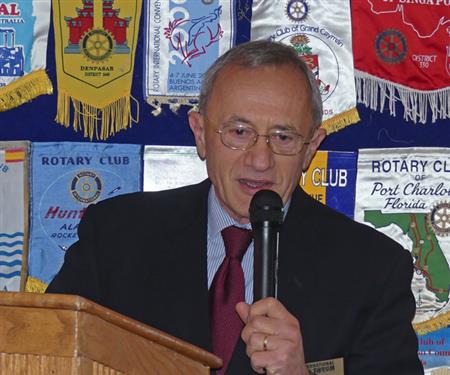Jack Segal, Co-Chair of the International Affairs Forum in Traverse City and retired diplomat who served in Russia (among many other places), spoke to a large and engaged audience of Rotarians and guests about our relations today with Russia and its leader, Vladimir Putin.
Jack explained how the once large and powerful Soviet Union collapsed after the Berlin Wall came down in 1989, leaving the much smaller country of Russia. Russia's economy was failing and the U.S provided aid in the form of food, as well as inventing an economic system for the country. When Boris Yeltsin took over as President, he and Bill Clinton became friends. In 1994 Clinton expanded NATO in eastern Europe. In 1999 Yeltsin had serious medical problems and before dying put Vladimir Putin--a former KGB counter-intelligence agent and consummate bureaucrat--as his successor (worrying at the time that he might have made a mistake).
When George Bush became President, Putin developed rapport with him but blamed him when the U.S. supported uprisings in Ukraine and Georgia. Putin and Barack Obama did not like each other. When demonstrations against Putin started in Russia, Putin engineered his own reelection. He doesn't worry about the Russian newspapers that are critical of him (since only the highly educated read the papers), but controls the TV stations and appears on a monthly basis to answer questions from callers-in. He has an 80% approval rating in Russia. Putin sees the U.S. as having interfered in Russian elections and sees the two countries as being at war. If he is reelected in 2018, he will be the country's longest-serving leader since the tsars.
When asked during Q&A what advice he would give to President Trump, Jack said he would urge the President to restore the budget and personnel of the State Department, noting that among other things the U.S. presently has no ambassador to South Korea.
